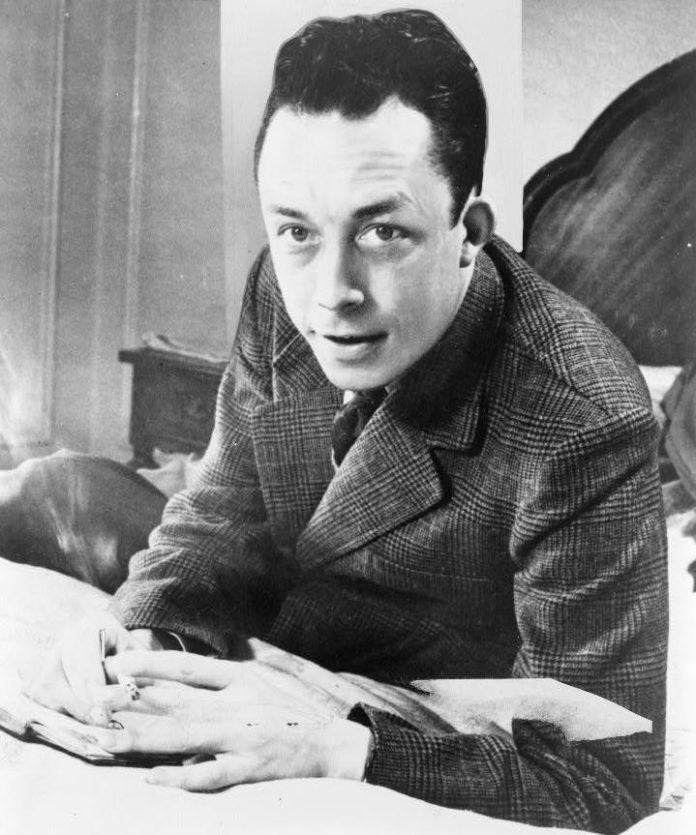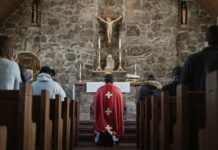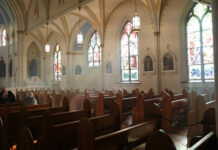
It’s widely held that Albert Camus was an outsider. He was and remains a non-conformist among non-conformists.
Alongside Camus’ cautious optimism about humanity is his willingness to break with collective intellectual and political trends. He was a fierce agnostic; critical of Christianity, yet still open to the feasibility of the uniqueness of Jesus Christ[i].
Although, to be fair, given Camus’ views on this and absolute truth, alone, it is debatable as to how far this could be stretched out and represented as him being open to seeing Christ as more than just a well-intentioned, but deluded revolutionary.
As far as Camus’ understanding of and lukewarm relationship with Christianity goes, Maya Angelou’s: ‘here then is my Christian lack, If I’m struck then I’ll strike back[ii]’ certainly finds legitimate traction.
Camus’ writings are sharp. His tone often influenced by the dire circumstances of his historical context and his targets those who claim one thing, yet project another.
Born in French Algeria, Camus later became a journalist, contributing to ‘Combat’; the left-wing media arm of the French Resistance, during Nazi occupation.
Camus, today, is pertinent because of is his open critique of the “Left”, and his ability to detach himself from any claim that could suggest he had sold out to the “Right”.
According to Olivier Todd, after writing ‘The Rebel’ Camus was hammered by critics and ostracised. This included being labelled by Jean Paul Sartre as being ‘someone who had always been vain.’[iii]
Todd adds:
‘Camus went against the grain among members of the left-wing intelligentsia. Facing a mummified admiration of revolution per se, Camus was fairly revolutionary in response to much of the current thinking in contemporary Paris.’[iv]
Jean Bethke Elshtain also noted:
‘Camus was no naïf. He knew what it meant to fight fascism. He feared what fighting fascism unleashed, namely, counter-terror in the name of an abstract Communist utopia. He disapproved of any passion for unity that saw opposition as treason. For his efforts, Camus was virtually excommunicated from the French intellectual life by Sartre and his comrades’[v]
It’s easy enough to understand why Camus, now an estranged golden-child of the “Left”, caused such an upheaval.
In 1957, near the close of an interview where Camus gave support for the counter-revolutionary movement in communist held Hungary, Camus stated that the ‘Left was schizophrenic and needed doctoring’:
‘We must hope for a common rallying. But first our Leftist intellectuals , who have swallowed so many insults and may well have to begin doing so again, would have to undertake a critique of the reasoning’s and ideologies to which they have hitherto subscribed, which have wreaked the havoc they have seen in our most recent history. That will be the hardest thing. We must admit that today conformity is on the Left.
‘To be sure, the Right is not brilliant. But the Left is in complete decadence, a prisoner of words, caught in its own vocabulary, capable merely of stereo-typed replies, constantly at a loss when faced with the truth, from which it nevertheless claimed to derive its laws.
‘The Left is schizophrenic and needs doctoring through pitiless self-criticism, exercise of the heart, close reasoning, and a little modesty. Until such an effort at re-examination is well under way, any rallying will be useless even harmful. None of the evils of totalitarianism (defined by the single party and the suppression of all opposition) claims to remedy is worse than totalitarianism itself.’[vi]
In sum, Camus fired a flare out from within the inner sanctum of Leftist elitism. Uncovering an oppressive movement that rides on the coattails of a utopia built on totalitarianism, enforced by appeasement and maintained by the carrot of emancipation, which only ends up enslaving people behind a false promise to deliver absolute freedom.
For the thinking Christian, Camus’ work stands as a cautious ally in the burgeoning wilderness that is the partially sedated West.
Speaking to bewildered citizens paralysed by the tug of war between those politicians, theologians and philosophers who build fortresses on either side of the ideological divide; who overlook the corruption; who ignore, for fear of being labelled intolerant, the inevitable disorder of the repression and redefinition of some traditions; who seek to play into the self-interest of some NGO’s, their supporters or anyone that might preach bipartisanship and unbias, but choose to function as propaganda units of political ideologues and the parties that promote them.
For the commonwealth of Christ (the Church), this dark, but lucid writer inadvertently issues a warning. Be careful about where your allegiance resides because ‘no one can serve two masters…Where your treasure is, your heart will be there also.’ (Jesus, Mt.6:21-24)
Source:
[i] Evident in ‘The Rebel’ and partially highlighted within his statements made at a Dominican monastery in 1948 and included in the text ‘The Unbeliever and Christians’.
[ii] Angelou, M. 1981 Maya Angelou: Poems Bantam Books
[iii] Todd, O. 2013, Afterward in Camus, A. The Rebel (Penguin Modern Classics) Penguin Books Ltd. Kindle Ed.
[iv] Ibid, Loc. 4134-4137
[v] Elshtain, J.B. 1995 Democracy On Trial Basic Books
[vi] Camus, A. 1961 Resistance, Rebellion and Death: Essays; ‘Hungary: Socialism of the Gallows’, Alfred A. Knopf, Inc. 1960 First Vintage International Edition
Image: Albert Camus, Camus Society FB page.










